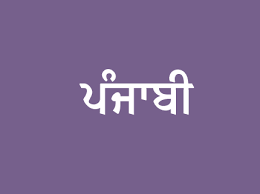Language/Panjabi/Grammar/Pronouns
Hi Panjabi learners! 😊
In this lesson, you will learn about pronouns in Panjabi. Pronouns are words that are used in place of nouns to avoid repetition.
After mastering this lesson, these related pages might interest you: Panjabi Grammar → Basic Sentence Structure → Subject-Object ..., Nouns and Pronouns, Conjunctions & Past Tense.
Personal pronouns[edit | edit source]
Personal pronouns are used to refer to people or things, and they change depending on the subject and the object.
| Panjabi | Pronunciation | English |
|---|---|---|
| ਮੈਂ | /mẽ/ | I, me |
| ਤੂੰ | /tũ/ | you |
| ਵਹ | /vəh/ | he, him, she, her, it |
| ਅਸੀਂ | /əsĩ/ | we, us |
| ਤੁਸੀਂ | /tusĩ/ | you (plural or formal) |
| ਉਹਨਾਂ | /uɦ.nã/ | they, them |
Here are some examples:
- Person 1: ਮੈਂ ਯਾਦਵਿੰਦਰ ਸਿੰਘ ਹਾਂ। (I am Yadwinder Singh.)
- Person 2: ਤੁਸੀਂ ਕਿਥੇ ਤੋਂ ਹੋ? (Where are you from?)
- Person 1: ਮੈਂ ਕੈਨੇਡਾ ਤੋਂ ਹਾਂ। (I am from Canada.)
- Person 2: ਵਹ ਕੈਨੇਡਾ ਵਿੱਚ ਰਹਿੰਦਾ ਹੈ। (He lives in Canada.)
Possessive pronouns[edit | edit source]
Possessive pronouns are used to express possession or ownership.
| Panjabi | Pronunciation | English |
|---|---|---|
| ਮੇਰਾ | /me.ɾa/ | my |
| ਤੇਰਾ | /te.ɾa/ | your |
| ਉਸਦਾ | /us.da/ | his, her, its |
| ਸਾਡਾ | /sa.ɖa/ | our |
| ਤੁਸੀਂਦਾ | /tu.sĩ.da/ | your (plural or formal) |
| ਉਨਾਂਦਾ | /u.nã.da/ | their |
Here are some examples:
- Person 1: ਮੇਰਾ ਦੋਸਤ ਇੱਕ ਵਕੀਲ ਹੈ। (My friend is a lawyer.)
- Person 2: ਉਸਦੇ ਪਾਸ ਇੱਕ ਪਿਆਨੋ ਹੈ। (He has a piano.)
- Person 1: ਸਾਡੇ ਘਰ ਵਿੱਚ ਤੀਜੀ ਮੰਜ਼ਿਲ ਹੈ। (We have a third floor in our house.)
Demonstrative pronouns[edit | edit source]
Demonstrative pronouns are used to point to specific people or things.
| Panjabi | Pronunciation | English |
|---|---|---|
| ਇਹ | /i.hə/ | this, these |
| ਉਹ | /uɦ/ | that, those |
Here are some examples:
- Person 1: ਮੈਂ ਇਹ ਪਰਚਾ ਲਾਵਾਂਗਾ। (I will get this document.)
- Person 2: ਉਹ ਕੌਫੀ ਪੀ ਰਿਹਾ ਹੈ। (He is drinking coffee.)
Interrogative pronouns[edit | edit source]
Interrogative pronouns are used to ask questions.
| Panjabi | Pronunciation | English |
|---|---|---|
| ਕੌਣ | /kaun/ | who |
| ਕੀ | /ki/ | what |
| ਕਿਸ | /kis/ | which |
Here are some examples:
- Person 1: ਕੌਣ ਹੈ ਤੁਸੀਂ? (Who are you?)
- Person 2: ਮੈਂ ਰਾਮ ਹਾਂ। (I am Ram.)
Summary[edit | edit source]
In this lesson, you learned about different types of pronouns in Panjabi. Here is a summary table:
| Type | Use |
|---|---|
| Personal | Referring to people or things |
| Possessive | Expressing possession or ownership |
| Demonstrative | Pointing to specific people or things |
| Interrogative | Asking questions |
To improve your Panjabi Grammar, you can also use the Polyglot Club website. Find native speakers and ask them any questions!
Dialogue[edit | edit source]
- Person 1: ਤੁਸੀਂ ਕਿੱਥੇ ਜਾ ਰਹੇ ਹੋ? (Where are you going?)
- Person 2: ਮੈਂ ਕਾਰਨਾਲ ਜਾ ਰਹਾ ਹਾਂ। (I am going to Karnal.)
- Person 1: ਕੀ ਤੁਸੀਂ ਕਾਰ ਵਿੱਚ ਜਾ ਰਹੇ ਹੋ? (Are you going by car?)
- Person 2: ਹਾਂ, ਮੈਂ ਕਾਰ ਵਿੱਚ ਜਾ ਰਹਾ ਹਾਂ। (Yes, I am going by car.)
Sources[edit | edit source]
Other Lessons[edit | edit source]
- Conditional Mood
- Negation
- Plural
- Give your Opinion
- How to Use Be
- Gender
- Adjectives
- Questions
- Future Tense

